Posted 2011/4/27
Some Other Opera
Yue Ju
Yueju Opera, also known as Shaoxing Opera, originated in the city of Shaoxing in neighboring Zhejiang Province in the mid-19th century during the late-Qing Dynasty (1644-1911). Shaoxing Opera is particularly popular south of the Yangtze River and combines classical singing, dancing and acting.



"Since most Yueju Opera performers are women - with even the male parts played by women - the opera has a distinctively feminine style," You says.
Yueju is noted for the sweetness of its melodies which are interspersed with jubilant music and dazzling performing skills. It is markedly different from other traditional Chinese operas. The storylines involve romantic entanglements and family affairs and not politics or history.
"Many old people, like me, applaud this opera form because it's not difficult to learn," says Lin Baobao, a 60-something Yueju Opera fan. "The costumes and make-up are eye-catching and remind us of the prime of our youth."
Yueju also has various schools such as the "Yuan School," the "Xu School" and the "Fu School." The famous and heartrending Chinese violin concerto, "The Butterfly Lovers," also derived its inspiration from Yueju Opera.
However, under the inundation of competition from modern forms of popular entertainment, Yueju Opera and other traditional Chinese operas face a struggle to survive, let alone flourish.

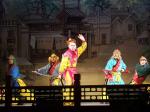

For the upcoming gala of some 20 shows, academic forums and book publishing, the Shanghai Yueju Opera House has invested around 1.5 million yuan, a massive sum for any traditional opera troupe in China.
"Only a few of the plays to be staged have received government aid," You says. "We're trying to break even from box-office sales."
Audience-oriented performances with emphasis on the appearance of young performers, plus various promotions for the gala, are the approaches taken by You and his team to keep this centuries-old art form alive.
"The audience always has top priority," You says. "Compared with many other operas, Yueju, thanks to its easy-to-understand and tender storylines, is more popular. But that's still far from being enough. In future, we will have to look for more fashionable elements to attract young white-collar workers."
In the past, the Shanghai Yueju Opera House troupe has traveled to China's north and west to promote this special art form. In November, the troupe will tour local universities to give students an insight into the opera's charm.
"And a lack of new talent is another big problem for Yueju Opera and other troupes," You says. "What we can do is try to provide young performers with a bigger stage on which to show off and develop their talent."
Yu Opera, also named "Henan Bangzi" or "Henan High Tune", emerged during the late Ming Dynasty and the early Qing Dynasty.
Yu opera is noted for its demanding melodies, strong rhythms and intensive use of spoken language. Yu Opera is popular to the broad masses for it is full of local features and rich flavor of life. Unsophisticated, plus exquisite and vivid performances, it becomes a major local opera in Henan Province and enjoys nationwide popularity. There are more than 600 traditional plays in the repertoire of Yu Opera, among the most well known are Chang Xiangyu's Kao Hong, White Snake Story, and Hua Mu Lan, and Ma Jinfeng's Mu Guiying Assumes Command, and Chaoyanggou as a modern play.
The following is a list of famous Yu opera plays:
Arranged Marriage(Qin Xuemei in Chinese): During the Ming Dynasty, Qin Xuemei and Shang Lin are engaged as children. Later, when Shang's family is persecuted by malicious ministers, he goes to live with the Qin family. But Qin's father no longer agrees on his daughter's marriage to then yuong man and drives Shang out. When he returns to his own home, Shang becomes seriously ill and soon dies. Overwhelmed with sorrow and againgst her father's wishes, Qin goes to the Shang family for the funeral.
Clever Magistrate (Tang Zhixian Shen Gao Ming in Chinese): Yan Song is a treacherous prime minister during the Ming Dynasty. His arrogant sister, who enjoys an honorary title by imperial mandate persuades her son Cheng Xiniu to capture Lin Xiuying, a local woman. A heroic man defends Lin, but during the fight, Cheng Xiniu is accidentally killed by his servants. In her fury, Cheng's mother has her servants beat Lin's father to death. Only Magistrate Tang dares to try the case and with clever tricks, he defeats this arrogant woman.
Chaoyanggou Village (Chaoyanggou in Chinese): Yinhuan, a high school graduate, comes to her fiance home village, Chaoyanggou, to take part in agricultural production. Meeting a lot of difficulties, she wavers between two choices: settling down in the backward village or returning to the city for a comfortable life. Through labour, she begins to understand the local people and is determined to devote her youth to the building of a new rich village.
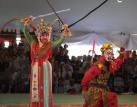

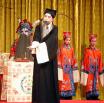
Modern Woman, (Fuliu Nuren in Chinese): In the midst of China's urban and rural economic reforms in the 1980s, Yang Hua, a young pretty widow, decides to open a village clothing factory. But her remote mountain village criticizes her ambitious plan. Her father-in-law and some grassroots cadres opposes her, but Yang does not give in. The factory opens, a direct challenge to the village's traditional agrarian values.
Romantic Scholar (Fengliu Caizi in Chinese): The opera vividly describes the beautiful romance between Tang Bohu and Qiu Xiang. Tang was a romantic scholar chased by dozens of charming women. He resists them all, including his cousin Feng Yulan, a beautiful lady from a rich family. One spring day, Tang goes sightseeing on Suzhou's Huqiu Hill and encounters Qiu Xiang, a maidservant with a high-ranking official's family. Tang falls in unrequited love with Qiu. Giving up the opportunity for an official post and ignoring views of others, he disguises himself as a servant to get close to Qiu Xiang. After experiencing countless troubles, he achieves what he wishes
Er'renzhuan (Song and Dance Duet), was also known as "bengbeng". Speaking and singing alternately is the main performing form of this kind of drama.
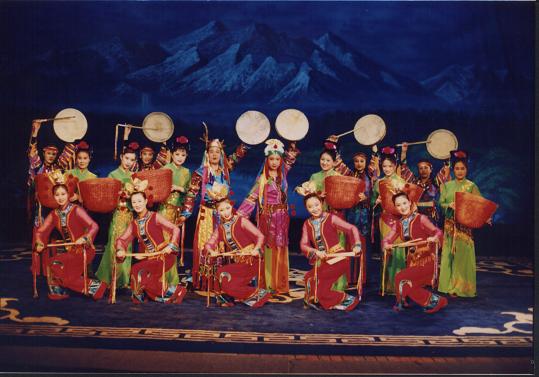
Er'renzhuan was originally developed on the basis of northeast yanggo dance and lianhualao (a popular song sung to the accompaniment of castanets) and inherit some elements from local performing arts in other forms such as northeast dagu, bangzi, shadow show, etc. The most striking feature of "er'renzhuan" is that "one actor and one actress play a large number of various roles". The players have fans, handkerchiefs and bamboo boards in their hands as stage property and their performance are mainly accompanied with banhu fiddle (a bowed stringed instrument with a thin wooden soundboard), suona horn (a woodwind instrument) and bamboo boards.
Er'renzhuan was a popular small local folk opera in all Northeast China. It started to spread in Jilin Province in the beginning of the 18th century.
After the founding of w China, Bengbeng was renamed er'renzhuan. And local opera groups were set up earlier or later in cities of Siping, Liaoyuan, Jilin, Changchun and Counties of Yushu, Lishu, Dehui, Shuangliao, Fuyu, Zhenlai for the performance of er'renzhuan. In 1960's, Jilin Province made great progress in the construction of er'renzhuan with writing and directing strengthened, a new list of plays opened, music accompaniment richened, costumes improved, dancing and fine arts enriched, hand property developed and changed.
Er'renzhuan's musical forms have been renewed continuously since the reform and opening up to the outside world in 1978. Now dulcimer, pipa (a flucked string instrument with a fretted fingerboard) are added to musical instrument accompaniment. When there is fighting in a play, drums, gongs and cymbals will be used. Also colored umbrellas, gauze kerchiefs and long silk fabric are added to the hand props. Costumes are improved according to the requirements of the creation of typical characters. Change of lighting colors is used to set off play scenes. In brief, the comprehensive artistic quality is increasingly improved.
Some famous actors and actresses are warmly welcomed by the mass, such as Mu Xifa, Li Qingshan, Guan Changrong, Dong Xiaofang, Li Xiaoxia, Qin Zhiping, Zheng Guiyun, Han Ziping. Among the popular Er'renzhuan play list are Splashing Water before Horses, Returning Cups, Lord Bao Bringing Empress to Trial, Lord Bao's Apology, Listening to qin, The West Chamber, Both in Martial Competitions , Feng Kui Selling His Wife and Waters Flooded Lanqiao Bridge. These plays have been existed for a very long period.
The expression means of er'renzhuan is characterized by "four basic trainings and one unique skill". The four basic trainings refer to singing, speaking, playing and dancing. The one unique skill refers to brandishing handkerchiefs, fans, bamboo boards, and etc., which enjoys great reputation domestically and internationally.
Kun Opera
Kun Opera, also called "Kunshanqiang" or "Kunqu", originated in the Kunshan region of Jiangsu. It is one of China's classical operas, with a history of more than 500 years.
During the reign of Emperor Jiajing, Ming Dynasty (1368-1644), Wei Liangfu, a famous musician, combined the essences of Haiyan and Yiyang styles and created the well-known "Shuimoqing", contributing to the development of Kun Opera.
Kun Opera has a complete system of acting as well as its own distinctive tunes. Its wide-ranging repertoire has many delicate and elegant tunes. The orchestra consists of traditional instruments including the dizi, a horizontal bamboo flute which plays the lead part; xiao, a vertical bamboo flute; sheng, a mouth organ and pipa, a plucked string instrument with a fretted finger board. Many Chinese local operas are greatly influenced by its tunes and acting style.
There are two schools of Kun Opera: the Southern Kun, which is prevalent in Jiangsu and Zhejiang provinces, and the Northern Kun, prevailing throughout North China. Yu Zhenfei is the best known actor of Kun Opera.
To know more about Kun Opera, you can look through the following synopses of famous plays of Kun Opera:


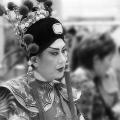
Escorting Jingniang Home(Qianli Song Jingniang): Zhao Kuangyin(927-976 AD) is a brave warrior who becomes the Song emperor. Once he rescues a girl named Jingniang who has been kidnapped by a group of bandits. He makes the girl his sworn sister while escorting her home to avoid the rumour that he may have had an affair with the girl. The girl's father wants to marry off his daughter to Zhao, who declines the marriage, insisting that they are sworn brother and sister. The girl commits suicide, and her soul escorts Zhao to his destination.
Fifteen Strings of Coins(Shiwu Guan): The opera is set in the Ming Dynasty (1368-1644). Lou Ashu, a rascal from Wuxi County, kills the butcher You Hulu and takes his 15 strings of coins. Without investigation, the county magistrate Guo Yuzhi concludes that Xiong Youlan and Su Shujuan are the murderers. Before they are executed, the Suzhou governor, Kuang Zhong, decides that Xiong and Su may be innocent. Kuang goes to Wuxi to investigate and arrests the real murderer. Xiong and Su are released.
Love at First Sight(Qiang Tou Ma Shang): During the Tang Dynasty, Pei Shaojun, a minister's son, and Li Qianjun, a minister's daughter, fall in love at first sight. Li's father wants her to marry the prime minister's son, so Pei and Li elope. Later, when Pei passes the imperial examination and wins the title "Number One Scholar," their parents accept their marriage.
South Tang Dynasty Tragedy(): Zhou Yuying, his wife's younger sister. The two men meet while hunting and reconcile, but not for long. When the empress dies, Li makes Zhou his new wife. Zhao also wants to marry her. Their conflict ends tragically. Zhao poisons Li, but then Zhou poisons herself and dies for the emperor.
Yan Xijiao: Zhang Wenyuan has no luck woooing Yang Xijiao, a woman beautiful but poor. Because Yan's mother needs money, she gives her daughter instead to Song Jiang as a concubine. But on their night together, Song's wife falls ill, and Song must leave. Zhang seizes the opportunity to enter Yan's room and they become lovers. One day, Yan discovers that Song works with outlaws. Burning with anger, Song kills Yan and the witness to his crime. In the afterlife, Yan pines for her lover, Zhang Wenyuan and her ghost captures him.
Yangge and Waist Drum Dance
During the season in winter, young people in villages in northern Shanxi begin doing the yangge dance and waist drum dancing in order to greet Spring Festival (first day of the first lunar month) and Lantern Festival (15th of the first lunar month).
On the lunar New Year's Day, after eating jiaozi, the yangge group begins paying New Year calls to the households. They wish the hosts a happy New Year and do the yangge dance in the courtyards. Accompanied by drums, they wave red silk waist bands. The hosts set off firecrackers to welcome the dancers' arrival and invite them to taste their home-made rice wine. The sounds of songs, drums and firecrackers blend, creating a festive atmosphere in the village. Yangge originated 2,000 years ago, as a religious activity to greet gods and dispel evil, but now it is a recreational activity in the sowing season or on holidays.
The most interesting part is waist drum dancing. A dancer with a red drum tied to his waist holds a drumstick with red silk, beating the drum while dancing. The rhythmical drum sound and graceful dance show the straightforward and uninhibited character of villagers in northern Shanxi Province and is an expression of their happy and passionate feelings.
Ansai waist drum dancing and Luochuan waist drum dancing in northern Shanxi have distinctive features. Ansai dancing includes vigorous movements accompanied by rhythmic drumbeats. At the climax of the dance, dancers beat drums while jumping into the air, uttering the sound "Haihai"excitedly. Louchuan dancing is done with a drum as big as washbasin and the drumstick is long and thin. The dancers wear white war gowns, with a towel tied on their heads and flags on their backs. Their costumes are decorated with the designs of ancient bronze wares. They dance back and forth, jumping from time to time, to the drums just like soldiers fighting each other.
Decayed wooden drums covered with boa skins were unearthed from the Yin ruins of Anyang City, Henan Province, which implies that drums appeared more than 3,000 years ago. In ancient times, drums were used to offer sacrifices, fight the enemy, sound alarms, and give the time, as well as for daily recreational activities.
As for the origin of the waist drum in north Shanxi Province it is thought that it was a tool for officers in ancient times and for soldiers stationed at borders to sound alarms, and give the time, as well as for daily recreational activities.
As for the origin of the waist drum in north Shanxi Province it is thought that it was a tool for officers in ancient times and for soldiers stationed at borders to sound alarms and train troops. Especially for cavalries, the drums accompanied the rhythm of the horse's hooves, as the soldiers yelled and advanced. Later, the waist drums were handed down among the people by demobilized soldiers. This was deduced from the fact that the waist drums in northern Shanxi are popular in the frontier fortress regions near the ancient Great Wall and that dancers dress in the clothing of ancient warriors and the dances have martial elements and formations similar to those of ancient times. Another view of the origin of the dance is that shepherds in northern Shanxi Province were the earliest makers of the waist drums. They beat drums made with sheepskin to liven up their lonely life. Later, beating drums, along with other percussion instruments, gradually became a recreational activity for villagers to pray for favourable weather for crops and a happy life.



Northeast China's Yangko Dance
In the old days in Northeast China, Yangko performances were divided into two categories, one sponsored by the local government and the other by private clubs. Performances would always begin with a man playing the role of Lord Shagong leading the way. Loard Shagong would usually be an excellent performer, skilled at both singing and narrating. In addition, he had to speak or sing off the cuff, improvising according to what he saw along the way. The dancers were usually dressed up as legendary figures such as Tripitaka, the Monkey King or Pigsy from the novel Journey to the West, or as other characters made famous through tales and myths. All the performers would be dressed in gorgeous clothes and wear heavy make-up.
An interesting aspect of the traditional type of performance was that the Lord Shagong would often use the opportunity of being on stage to voice his own opinions. The Lord Shagong of the officially sponsored teams, for example, would sing and speak in praise of "peace" and "prosperity", while the private club's Lord Shagong would mock various social evils during his performance. Sometimes when competing against each other, two Yangko teams would often clash, occasionally even coming to blows, due to differences of opinion.
Today, the Yangko dance of the Northeast has evolved into a new form known as Little Yangko. The dancers all wear the same costumes and follow the same dance steps as before, and still hold fans or colourful ribbons in their hands. The only difference is that there is no longer a Lord Shagong leading the way.
In recent years, elderly people in Harbin's suburbs have been organizing themselves into Yangko teams, with the dancers mostly in their enjoy themselves while keeping fit all year round. In the countryside, Big Yangko teams are organized for wedding celebrations, birthday parties and so on. During the busy farming season the dancers work in the fields, but when the lunar New Year comes around they put on their costumes and go to private homes to perform the Yangko dance, ushering in the new year and carrying on an age-old tradition.
Huangmei Opera
Before 1949, rivers and lakes often flooded, and the displaced victims had to seek refuge in neighbouring provinces. Thus Hubei's Huangmei Opera was brought to Anhui by victims of flood and famine. It developed from folk tunes to short operas and complete dramas. Nowadays, the lively short operas, called "everyday shows", are still performed frequently. Even "big plays" are almost always about folk life. The performers manage to infuse simple humour into plays about the privileged, so that audiences see a down-to-earth way of life in all the 72 short plays and 36 full-length dramas that have accumulated.
From the time when Huangmei Opera earned its initial popularity in the rural areas, it had a long way to go from recreational activity there to professional performances in the cities. It began as a diversion acted by and for peasants and artisans, usually at festivals and special solar times (the 24 weather-oriented divisions of the year).
As time went by, seasonal, semi-professional groups appeared, and they had to perform together with troupes specializing in more popular forms like Beijing Opera and Anhui Opera. Not until 1926, 140 years after its advent, did the Huangmei Opera manage to reach Anqing, then the capital of Anhui Province. It appeared in Shanghai in 1934, but only on the cheap stages of the city's poor quarters, where it was denounced as "bawdy entertainment" and where its unfortunate performers were harried by the local authorities.
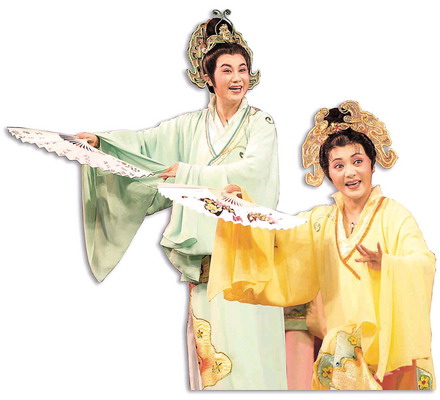
Since 1949, with the support of the government, the Huangmei Opera has bloomed like a wildflower. In particular, the Anhui Provincial Huangmei Opera Troupe's "The Heavenly Maid and the Mortal" began a new epocj in its history. Though the play was a traditional favourite, the troupe revised the script, music and make up.
The opera tells how the Jade Emperor of Heaven has seven daughters, the youngest of whom, the ravishingly beautiful Seventh Fairy Maiden, daringly flees down to the world in search of a love of her own choosing, and marries Dong Yong, an honesr, kind-hearted serf, in defiance of her father. She makes the cruel landlord shorten Dong Yong's three years' indenture to 100 days, but just as they are leaving to set up their own home, the Jade Emperor has her snatched back to heaven, breaking up the happy couple. Pregnant and indignant, she writes a letter in her own blood to Dong, vowing, "When next spring comes and the flowers bloom, your son shall be yours beneath the scholar trees."
The moving plot, beautiful music and excellent singing made the play a household work. It was filmed in 1956, when there were few opera films, and given 150,000 domestic showings, also travelling to a dozen or so places abroad, so that the obscure wildflower became a masterpiece admired by thousands. The success owed much to the work of renowned performers, among them Yan Fengying, a country girl from Luojialing in Tongcheng County, Anhui Province. A versatile performer who played a variety of roles, she died young, a great loss to the profession. Anqing City put up a statue of Yan Fengying as Seventh Fairy Maiden in one of its parks.
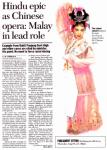

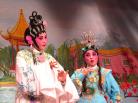
The music of Huangmei Opera is its essential attraction. Three kinds of music are used: coloratura, character songs and basic tunes. The 104 coloratura tunes are taken from folk songs, tea-picking songs and other ditties. A short opera usually has its own features, whose name is often the title of the piece, which may owe most of its popularity to the tune. The music of Huangmei Opera is light and lyrical, so a good performer must have facility in this style. Singing is not only the main approach to characterization but also makes Huangmei Opera distinctive stylistically and musically.
Huangmei Opera is easy to understand and learn, thanks to its lyrical tunes, simple words and literary tradition. Like other Chinese local operas, Huangmei Opera also used local dialect, in this case that of Huangmei and Anqing, where the opera originated and matured. The language is a mixture of northern and southern and therefore easy for others to imitate while remaining pleasant to native ears. This was conducive to the spread of Huangmei Opera. Its local flavour and folk style are most vividly revealed in its original and lively dialogue, both spoken and sung.
Passion, natural and simple, is what makes Huangmei Opera an enduring drama appreciated by all.
During the First China Shakespeare Festival in 1986, audiences both at home and abroad watched with respect and inteest an adaptation of Shakespeare's "Much Ado about Nothing" presented by the Anhui Provincial Huangmei Opera Troupe. British Prime Minister Margaret Thatcher sent a message of congratulation to Cao Yu, chairman of the Chinese Dramatists' Association, suggesting that Shakespeare would have been greatly amused by the imaginative representation.
Ping Opera
Ping Opera is very popular in Beijing, Tianjin, North and Northeast China. It has a history of more than 70 years. Developing out of LianhuaLuo, a kind of story- singing in the east of Hebei Province, it borrowed the tunes and acting style of Peking Opera, Hebei Bangzi Opera, shadow shows and drum melody, and developed its own style. Since moving from the rural areas into the cities, it has produced many new programmes influenced by modern drama and Peking Opera. Its specializes in reflecting urban dwellers' life with easily-understood text, speech-like tunes, clear articulation and the richness of everyday life. At first, female characters in Ping Opera were dominant and their tunes were beautiful and touching, while the male tunes were quite simple. After the founding of the People's Republic of China, the male arias have been greatly developed and there are many new plays in which male characters play the lead roles. Xin Fengxia is one of the representative performers of the opera.
The following is a list of famous synopses of Ping Opera. Child Husband(Xiao Nuxu): Set in the early 1950s, this opera tells the story of Yang Xiangcao, a young woman in Yangjia Village, who is engaged to Tian Xi, Yang's father forces her to marry Luo Changfang, the 11-year-old son of Widow Luo, just for Luo's generous betrothal gifts. Yang and Tian sue Yang's father in the county court. The judge awards Yang a divorce and she and Tian finally get married.
Empresses, The(Jiemei Huanghou): This opera is about conflicts within a royal family in the Liang Dynasty (502-557 AD). The Liang Emperor, who is over 70, wants to crown a prince, and Prime Minister Lu Hao recommends that he choose Xiao Xun, the emperor's eldest son. But Empress Bi doesn't agree, since Xiao Xun is the offspring of an imperial concubine. The empress wants her own son Xiao Ying to ascend the throne so that she may hold court from behind a screen. The ensuing clashes make for entertaining opera.
Flowers as the Keepsake(Hua Wei Mei): Wang Junqing meets his cousin Li Yue's at his father's birthday party and is attracted by Li's beauty. But Li's father opposes the consanguous marriage. Zhang Wuke, a pretty young woman, is willing to marry Wang Junqing but Wang refuses. Matchmaker Ruan arranges a meeting between Wang Junqing and Zhang Wuke. Wang asks his brother Junqing to meet Zhang on his behalf. Zhang and Junying fall in love with each other at first sight. The opera has a happy ending as Wang Junqing marries Li Yue's and Junying marries Zhang Wuke.
Chuan Opera is one of China's oldest local operas, popular in Sichuan Province and some regions of Yunnan and Guizhou provinces. During the early years of the Qing Dynasty(1644-1911) there were five independent local operas prevalent simultaneously in the Sichuan area. In the course of evolution, they were gradually merged into what we call Chuan Opera. Among them, Gaoqiang(high tune) is the richest, with a distinctive Sichuan local color. It is accompanied only by percussion and chorus without any wind or string instruments. Chuan Opera's wide repertoire has a strong literary quality, and is full of wit, humor and lively dialogue with a pronounced local flavor. It also has built its own system of stylized movements. Special characters use stunts such as immortals who have a third eye on their forehead that they can open suddenly to show their magic power; quick changes of facial characteristics without makeup; jumping through burning hoops, and hiding of swords.
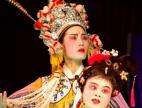
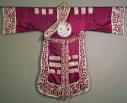

The following is a list of famous synopses:
Dongxiang Massacre, the(Bashan Xiucai): In Sichuan during the late Qing Dynasty, Dongxiang County is hit by a serious drought. The victims ask the local government for relief food. But the county magistrate falsely tells his superiors that the local people want to rebel. So the provincial military commander commands an end to the rebellion, and 3,000 innocent people are massacred. Meng Dengke, a scholar from Sichuan, voices his sorrow for the 3,000 wrong souls. The news reaches Dowager Ci Xi, who orders an investigation into the incident and punishment for those responsible.
Husband-Wife Bridge, the(Fuqi Qiao): The opera is set in Sichuan Guangxian County during the reign of Emperor Jiaqi of the Qing Dynasty. At the Fulong Ferry by the Minjiang River, many passengers are drowned in summer floods. Zeng Xiwu and Fan Laome, two local ruffians, control the ferry and extort money from the passengers. He Xiande, a young school teacher, is determined to build a bamboo chain bridge. He is supported by the local people but threatened by Zeng and Fan. Due to the actions of corrupt officials and local ruffians, the bamboo chain bridge is destroyed on a stormy night and He is killed. He's wife continues the work left by her husband and, with the joint efforts of the people, the bridge is built as last.
Dajiao Furen(Madame Big Feet): Madame Yang, known as "Madame Big Feet", is a distinguished lady with an honorary title by imperial mandate. Her son, a playboy, beats an old villager to death and then is accidentally killed by Wu Xianliang, a hero. Madame Big Feet chooses the law over her maternal feelings and orders her son's corpse to be left in the street for three days. Then she adopts Wu as her son and together, they go to join the imperial force to defend the country.
Profile of Tao Furu(Funu Zhuan): Tao Furu, a talented woman in Hangzhou, is engaged to Xi Xianchun, a scholar from Suzhou. They promise to meet at West Lake. But Xi does not keep his promise, instead he goes to Suzhou to see his mother, who is serious ill. Su Ran, a local official, happens to visit West Lake and is attracted by Tao's beauty. Su attempts in vain to take Tao as his concubine: he arrests Tao's father on a fabricated charge and puts Tao in a brothel. Jia Lian, a blind storyteller, sympathizes with Tao and writes a profile of Tao Funa, which is soon well-known in Hangzhou. After reading the profile, Chen Gangchu, a hero from Taihu Lake, kills Su Ran and saves Tao Furu. In the end, Tao is reunited with her father and her fianc?
Romantic Confusion(Qiao Taishou Luan Dian Yuanyang Pu): Scholar Sun Run meets a young woman, Liu Huiniang: another scholar Pei Zheng, falls in love with Xu Wengu. When they exchange keepsakes, the two couples make a careless mistake and receive mismatched mementoes. But the mistake meets their parents' marriage arrangements. Love becomes more confusing when at the wedding ceremony, a third "couple" stands in for the two families. Only Commissioner Qiao can unravel these romantic complications and make three "perfect" matches.
Unfaithful Scholar, the(Du Shiniang): At Yanjiang, scholar Li Jia falls in love with Du Shiniang, a prostitute. Du buys back her freedom with her savings and begins travelling home with Li. But along the way, Li meets Sun Fu, a rich salt merchant who warns Li not to bring home a prostitute. In response, the unfaithful scholar promises to sell Du to Sun. Burning with anger, Du throws herself and a box of jewellery into the river.
Hebei Banzi
Hebei Bangzi is one of the major forms of local opera in Hebei Province. Formerly known as Jing Bangzi, Zhili Bangzi and Wei Bangzi, it adopted the official name of Hebei Bangzi in 1952. It is very popular in Beijing, Tianjin and some regions of Hebei, Liaoning, Jilin, Heilongjiang and Shandong provinces and Inner Mongolia Autonomous Region. Hebei Bangzi is derived from Qinqiang and Shanxi Bangzi operas, which were introduced to Hebei Province in the middle of the Qing Dynasty. Singing in Beijin dialect, its division of roles and its performance style are similar to Peking Opera. Xusheng, a man with whiskers, plays the leading male role and his tune is forceful and solemn. The Qingyi female role emphasizes loud, clear singing, and the Huadan female role stresses acting and dialogue. The tunes sung by Hualian a male role with painted face, is rustic and vigorous. Hebei Bangzi has a special acting role, the Jingsheng, which combines Sheng costumes, Jing tunes and the performance style of both Jing and Sheng. Musical patterns of Hebei Bangzi includes five types of rhythmic structures. The accompanying instruments are the banhu, two-stringed Chinese fiddle: dizi, horizontal bamboo flute: sheng, mouth organ, and percussion. The repertoire of Hebei Bangzi has more than 500 traditional and 200 contemporary plays.
The following is a list of famous synopses:
Butterfly Cup, The(Hudie Bei): Tian Yuchuana, son of a county magistrate, accidentally kills the governor's son who beat a fisherman to death. The fisherman's daughter, Hu Fenglian, immediately hides Tian from the police in the ship's hold. Tian falls in love with Hu and gives her a butterfly cup as a keepsake. Then Hu goes to the county officials to charge the governor's son for killing her father. the county magistrate also argues on her behalf. In the end the case is left unsettled.
Magic Lotus Lantern, The(Baoliandeng): The Goddess of Mount Hua, who helps people with her magic Lotus Lantern, falls in love with a mortal Liu Yanchang. They get married and have a son named Chen Xiang. But the goddess's brother cannot bear to see his sister marry a mortal. He orders his heavenly dog to steal away the Lotus Lantern and hide the goddess in Mount Hua. Later an immortal teaches Chen Xiang martial arts so he can split Mount Hua open and saves his mother.
Unwilling Concubine, The(Chen Sanliang): Chen Sanliang, a prostitute, is sold to a rich merchant as a concubine. Because Chen refuses to go with him, the merchant charges her in Cangzhou court, where the corrupt governor cruelly tortures her. It so happens that the emperor command Chen Kui, the Number One Scholar, to inspect Cangzhou. Chen Kui saves Chen Sanliang and punishes the governor.
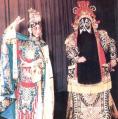

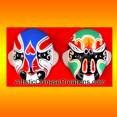
Chao Opera
Chao Opera, also called "Chaozhou Opera," is popular in the Chao'an and Shantou regions of Guangdong Province, in the southern area of Fujian Province and in Taiwan where people speak Chaozhou dialect. It is also performed in Chinese communities in other countries of Southeast Asia. Bases on the folk dances and ballad-singing of the Chaozhou region, it formed its own style under the influence of Nanxi(one of the oldest Chinese operas that originated in the Song Dynasty. Its tunes are graceful and pleasant, full of local color. The old form of choral accompaniment still remains its special features. The clowns and females are the most distinctive characters. The female performers are good at imitating the movements of animals, shadow figures and puppets, creating very pleasing and amusing effects. The fan-playing and acrobatic skills are especially unique.
The following is a list of synopses of famous plays in its repertoire.
Beauty's Tears, A(Meiren Lei): Feng Xiangluo is engaged to her cousin. The empress of that time is unable to bear children, and is worried that the throne will fall into some other family's hands. She carries Feng Xiangluo off to the Ankun chamber and forces her to have a child by the emperor. After Feng gives birth to a son, she is driven out of the imperial gate. Sixteen years later, the emperor dies. Xiangluo's son, Youcong, ascends to the throne. To safeguard his name and status, he murders his mother.
Girl Named Jin Hua, A(Jin Hua Nu): Jin Hua wants to marry Liu Yong, a poor student, in spite of his poverty. her brother, Jin Zhang, supports her but her greedy sister-in-law, Wu Shi, is totally against the marriage. Jin Zhang gives Liu Yong money to go to the capital and take the imperial examination. Jin Hua accompanies him. On the way they are attacked by robbers and finish up in the river. They are saved and Jin Hua returns home. She refuses her sister-in-law's attempt at an arranged marriage. She is sent to herd sheep and chop wood at Mount Nan as a punishment. Liu Yong, meanwhile, having passed the exam, comes to Mount Nan and chances upon Jin Hua. The couple reunite. Wu Shi is punished for her greediness and wickedness.
Idiot's Dream, A(Chi Meng): In the Han dynasty, Zhu Maichen, a student from a poor family makes a living by selling firewood. His wife Cui complains of his humble status, and forces him to let her leave him. Then she marries Zhao, a carpenter. One day Cui learns that Zhu Maichen has passed the imperial examination and become a magistrate at Huiji. She is filled with regret and anger. Vainly hoping for a reunion with Zhu, she has a dream, in which she has become an imperial mandarin in fine costume. br>
Meeting at a Convent(Antang Hui): Zhizhen, a nun, falls in love with Shen Guisheng, a scholar. They marry but Guisheng dies of an illness. Their son survives and is named Yuan Zai. Sixteen years pass before Yuan Zai learns of his origin and leaves for the convent in a bid to see his mother. Constrained by the pratices and disciplines of the convent, Zhi Zhen does not dare to recognize him as her son at first, but finally does, having heard Yuan Zai pleading, which touches her heart. Mother and son are reunited.
Meeting at the Firewood Hut(Chaifang Hui): Li Laosan, a small tradesman, puts up for the night in the firewood hut of an inn. He is alarmed to see the ghost of a young woman called Mo Erniang, who was murdered by a villain named Yangchun, and who begs Li Laosan to avenge her death. Mo Erniang is pretty , even though a ghost. The play demonstrates the wickedness of Yangchun and the honesty, humour and justice of Li Laosan. It was once popular in Southeast Asian countries as " a splendid picture of an interesting ghost on earth."
Snowfall in June, The(Dou Er Yuan): Dou Er and her mother-in-law, Cai, depends on each other for survival. One day, a hooligan, Zhang Lu'er, and his father, break in. Zhang's father wants to take Cai as his wife, and he himself wants to force Dou Er to marry him. The two women turns them down and in an attempt to poison Cai and seize Dou Er, Zhang poisons his father by mistake. He puts the blame on Dou Er, bribes the corrupt judges of her case, and has her sentenced to death. At high noon on a June day she is led out to execution. She cries to the blue sky for justice: "After my death, let it snow, to show I was innocent of these charges." After Dou Er has been executed it begins to snow heavily.
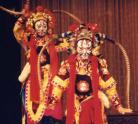

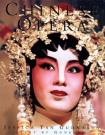
Stealing a Poem(Tou Shi): Pan Bizheng, a student, fails in the imperial examination and moves to a convent where he meets Chen Miaochang, a nun. They adore each other, but because of the strict religious disciplines, Miaochang is unable to reveal her affections, so she whiles away her time by writing poems. One day, Bizheng is in Miaochang's room and happens to read a poem revealing her love for him. He determined to court her and the two become a couple at last.